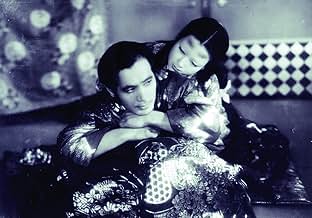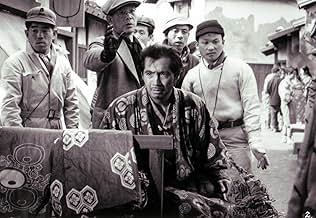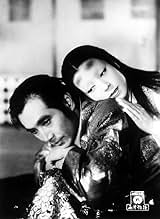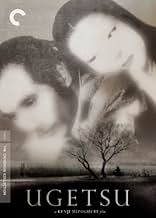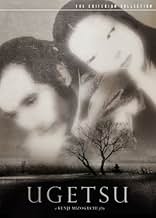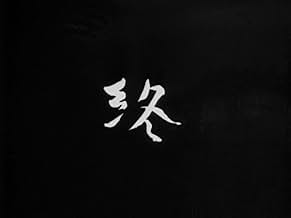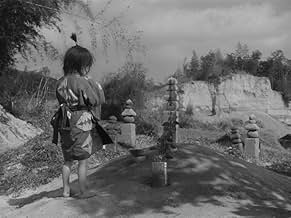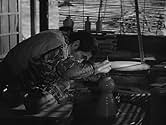IMDb-BEWERTUNG
8,1/10
27.429
IHRE BEWERTUNG
Eine Geschichte über Ehrgeiz, Familie, Liebe und Krieg inmitten des japanischen Bürgerkriegs im 16. Jahrhundert.Eine Geschichte über Ehrgeiz, Familie, Liebe und Krieg inmitten des japanischen Bürgerkriegs im 16. Jahrhundert.Eine Geschichte über Ehrgeiz, Familie, Liebe und Krieg inmitten des japanischen Bürgerkriegs im 16. Jahrhundert.
- Für 1 Oscar nominiert
- 6 Gewinne & 2 Nominierungen insgesamt
Eitarô Ozawa
- Tôbei
- (as Sakae Ozawa)
Empfohlene Bewertungen
The movie starts out pretty uncomfortably, two peasants in 16th century Japan who dream of richness and glory so blindly, they can't even hear the pretty straight-forward protests of their loving wives who try to convince them that their happiness is fine at home. When one, a pottery smith, makes a small bundle selling his wares, they decide to make a much larger batch together and become rich.
Forced out of their homes by an approaching war and uncertain where to go, they take their wares to a thriving market place, where the second peasant's ambition to be a samurai divides them and causes all four characters, the two peasants and their wives, to be separated, all fending for themselves amongst the war and various classes differently.
At this point the film reverses itself and instead of being a pretty skin-deep, tragic bud of greed, it blooms into a beautiful and haunting tale of obsession and illusion. The two main stories of the peasants and their wives are opposite only in their imaged realism, where one peasant falls completely under the curse of an enchanting ghost and the other lies and steals his way to fame, only both of them are eventually knocked down from their own hubris and forced to finally awaken to what their wives have said all along.
It's quite exquisite, this movie, with its long takes and its lack of the usual constructs that make up messages of obsession and greed. Once it gets beyond the small, uncomfortable, claustrophobic world of the peasant's home, it becomes audaciously challenging and mysterious, so that the same small home becomes amazingly wonderful and comforting. The very essence of the movie is breathed into the emotions of the audience in very subtle ways, making a very unforgettable cinematic experience.
--PolarisDiB
Forced out of their homes by an approaching war and uncertain where to go, they take their wares to a thriving market place, where the second peasant's ambition to be a samurai divides them and causes all four characters, the two peasants and their wives, to be separated, all fending for themselves amongst the war and various classes differently.
At this point the film reverses itself and instead of being a pretty skin-deep, tragic bud of greed, it blooms into a beautiful and haunting tale of obsession and illusion. The two main stories of the peasants and their wives are opposite only in their imaged realism, where one peasant falls completely under the curse of an enchanting ghost and the other lies and steals his way to fame, only both of them are eventually knocked down from their own hubris and forced to finally awaken to what their wives have said all along.
It's quite exquisite, this movie, with its long takes and its lack of the usual constructs that make up messages of obsession and greed. Once it gets beyond the small, uncomfortable, claustrophobic world of the peasant's home, it becomes audaciously challenging and mysterious, so that the same small home becomes amazingly wonderful and comforting. The very essence of the movie is breathed into the emotions of the audience in very subtle ways, making a very unforgettable cinematic experience.
--PolarisDiB
'Ugetsu' is a Japanese film directed by Kenji Mizoguchi based on stories in Ueda Akinari's book titled Ugetsu Monogatari. At the basic level, this is a story about survival during the Japanese Civil Wars in the late 16th century. The film follows two married couples namely Genjurō and Miyagi, Tōbei and Ohama of the Ōmi Province. They get uprooted along with a lot of other families when their village gets attacked by Shibata Katsuie's army. Genjurō being a potter decides to go to Ōmizo to sell his wares to earn money. He goes to Ōmizo with Tōbei and Ohama while Miyagi decides to stay back and take care of Genichi(Miyagi and Genjurō's son). While in Ōmizo, Genjurō gets attracted to the mysterious and enigmatic Lady Wakasa and becomes overwhelmed by his interest in her, and Tōbei, who was always a bit of a delusional dimwit, gets more and more inclined towards living the life of a samurai and show-off his bravery and strength. Tōbei ends up seeking out Samurai soldiers leaving his wife Ohama alone and helpless during chaotic wartime.
Along with 'Rashomon', 'Ugetsu' is considered by many critics to be the film that opened doors for Japanese cinema in the western world and gave the cinema in Japan a global exposure. Like 'Rashomon', this film was also based on Japanese folk tales, but Mizoguchi's humanist filmmaking made it relevant for the 1950s and its relevance hasn't waned at all in the last 50 years. 'Ugetsu' belonged to a whole line of films that got released after WWII along with 'Rashomon', 'The Bicycle Thief', 'The Planes are Flying', 'Ivan's Childhood', etc. which looked at war in a critical way instead of glorifying. They critiqued the very purpose of war by brutally depicting its devastating consequences. Although 'Ugetsu' is set in 16th century Japan during the Japanese Civil War, for me it clearly is an allegory for Japanese society during WWII and the allegory here is a lit bit more overt and obvious than the same in 'Rashomon'.
This can surely be seen as a feminist film. We see the men fall prey to puerile ambitions and greed, while the women are left helpless and asked to fend for themselves during a time of war when they are more prone to danger and harm with ravenous and wild warriors running around everywhere. But the women in the film do what they have to do without showing any fear and without accepting defeat. After watching this film, I don't think it is possible for anyone to not fall completely in love with the character of Miyagi. She has unconditional love for her husband Genjurō and their son Genichi. She does whatever she has to, to make sure her son survives under difficult, harsh conditions, when Genjurō was spending time with Lady Wasaka. This film shows the hopeless nature of gender inequality that existed in medieval Japan and how women were extremely vulnerable.
The film as I mentioned before is an allegory for the Japanese society and the Japanese political system in the WWII era. Like Tōbei, some men are too drawn to the idea of power and will go to any lengths to prove to others that they are powerful by engaging in pointless fights. Genjurō represents those people who being led by unrestricted greed want to utilise war in their own way by making use of people's troubles to fill up their pockets. Lady Wasaka is very mysterious and interesting character. She is a very Mephistopheles- like character who lures Genjurō into her world by promising him eternal happiness, wealth and love. The Faust-esque Genjurō falls for her and abandons his own family. If the people sitting on thrones are led by the greed for power and the greed for lust and wealth, it can sometimes lead to irreparable damage to their country and its people. This might sound preachy, but the film presents this through the screenplay instead of blatant sermons. The film is also a commentary on the disappearance of Buddhist ideals and principals in modern Japanese society.
Along with Mizoguchi's style of storytelling, one can't help but admire the skill of his camera work. The film has many beautiful wide shots which serve both purposes - beauty as well as thematic relevance. There are some seamless transitions from one scene to another. Mizoguchi also beautifully builds tension and sets a Gothic creepy atmosphere in certain scenes which lends the film a genuine horror element. However, 'Ugetsu' like 'Rashomon' ends in a very optimistic and emotional note.
'Ugetsu' is a film whose importance and significance in film history can never be questioned. It is an artistic allegory of life during wartime. As long as the concept of war exists in human society, this film will continue to have significant relevance.
Along with 'Rashomon', 'Ugetsu' is considered by many critics to be the film that opened doors for Japanese cinema in the western world and gave the cinema in Japan a global exposure. Like 'Rashomon', this film was also based on Japanese folk tales, but Mizoguchi's humanist filmmaking made it relevant for the 1950s and its relevance hasn't waned at all in the last 50 years. 'Ugetsu' belonged to a whole line of films that got released after WWII along with 'Rashomon', 'The Bicycle Thief', 'The Planes are Flying', 'Ivan's Childhood', etc. which looked at war in a critical way instead of glorifying. They critiqued the very purpose of war by brutally depicting its devastating consequences. Although 'Ugetsu' is set in 16th century Japan during the Japanese Civil War, for me it clearly is an allegory for Japanese society during WWII and the allegory here is a lit bit more overt and obvious than the same in 'Rashomon'.
This can surely be seen as a feminist film. We see the men fall prey to puerile ambitions and greed, while the women are left helpless and asked to fend for themselves during a time of war when they are more prone to danger and harm with ravenous and wild warriors running around everywhere. But the women in the film do what they have to do without showing any fear and without accepting defeat. After watching this film, I don't think it is possible for anyone to not fall completely in love with the character of Miyagi. She has unconditional love for her husband Genjurō and their son Genichi. She does whatever she has to, to make sure her son survives under difficult, harsh conditions, when Genjurō was spending time with Lady Wasaka. This film shows the hopeless nature of gender inequality that existed in medieval Japan and how women were extremely vulnerable.
The film as I mentioned before is an allegory for the Japanese society and the Japanese political system in the WWII era. Like Tōbei, some men are too drawn to the idea of power and will go to any lengths to prove to others that they are powerful by engaging in pointless fights. Genjurō represents those people who being led by unrestricted greed want to utilise war in their own way by making use of people's troubles to fill up their pockets. Lady Wasaka is very mysterious and interesting character. She is a very Mephistopheles- like character who lures Genjurō into her world by promising him eternal happiness, wealth and love. The Faust-esque Genjurō falls for her and abandons his own family. If the people sitting on thrones are led by the greed for power and the greed for lust and wealth, it can sometimes lead to irreparable damage to their country and its people. This might sound preachy, but the film presents this through the screenplay instead of blatant sermons. The film is also a commentary on the disappearance of Buddhist ideals and principals in modern Japanese society.
Along with Mizoguchi's style of storytelling, one can't help but admire the skill of his camera work. The film has many beautiful wide shots which serve both purposes - beauty as well as thematic relevance. There are some seamless transitions from one scene to another. Mizoguchi also beautifully builds tension and sets a Gothic creepy atmosphere in certain scenes which lends the film a genuine horror element. However, 'Ugetsu' like 'Rashomon' ends in a very optimistic and emotional note.
'Ugetsu' is a film whose importance and significance in film history can never be questioned. It is an artistic allegory of life during wartime. As long as the concept of war exists in human society, this film will continue to have significant relevance.
10lwalsh
Having read much about this film, I thought I knew what to expect when I finally had the chance to see it. I was wrong; no amount of writing can convey the richness and impact of the images and the overall flow of the film-- which is why this commentary will be brief. Suffice it to say that I recommend this film wholeheartedly to anyone looking for cinematic poetry (though not, probably, to those who, misled by its being set during the Japanese Civil Wars, expect an action film).
Perhaps the most striking thing about the film is the camera-work; on a first viewing one is scarcely aware of it much of the time, but the camera is in constant motion, emblematic of the restlessness which pervades not only the era and the central characters but, by implication, all of human life (in this regard, it's a very Buddhist film). This movement is never gratuitous; when the scene demands little or no movement the camera stays still. Notice, though, how often the camera's movement enhances the emotional impact of the scene, especially in the famous panning shot (not, as occasionally described, a 360 degree shot) of the reunion near the end. Along with this is Mizoguchi's penchant for long takes, which seduce the viewer into the rhythm of the film without calling attention to themselves or to his cleverness as a director.
But these are technical comments which may or may not be helpful in focussing a viewer's attention; what really matters is the film itself as a whole. It is truly beautiful, and powerful in the unexpected way of great poetry. Technique and emotion, simplicity of means and complexity of effects, walk hand-in-hand here, and the result is remarkable in a way which film rarely attains.
Perhaps the most striking thing about the film is the camera-work; on a first viewing one is scarcely aware of it much of the time, but the camera is in constant motion, emblematic of the restlessness which pervades not only the era and the central characters but, by implication, all of human life (in this regard, it's a very Buddhist film). This movement is never gratuitous; when the scene demands little or no movement the camera stays still. Notice, though, how often the camera's movement enhances the emotional impact of the scene, especially in the famous panning shot (not, as occasionally described, a 360 degree shot) of the reunion near the end. Along with this is Mizoguchi's penchant for long takes, which seduce the viewer into the rhythm of the film without calling attention to themselves or to his cleverness as a director.
But these are technical comments which may or may not be helpful in focussing a viewer's attention; what really matters is the film itself as a whole. It is truly beautiful, and powerful in the unexpected way of great poetry. Technique and emotion, simplicity of means and complexity of effects, walk hand-in-hand here, and the result is remarkable in a way which film rarely attains.
10notmicro
This holds a special place in my heart, and I still consider it to be absolutely one of the very greatest films ever made for adults. The work of a mature artist, it resonates with Buddhist practice, and is a profoundly moving tale of the suffering of the human condition, the violence of war, the possibilities of art uplifting the spirit, the possibilities of redemption of character. The closing scene is one of such deeply-felt compassion and understanding that it is almost frightening; it prefigures in a way the stunning and more personal close of the subsequent Mizoguchi film "Sansho the Baliff".
On a lighter level, it is an amusingly sly allegory of the actual history of Japan for the 20 or so years prior to 1953, where in the end the women, embittered (or dead) as a result of their men's quixotic quest for military glory or war-profiteering, entreat them to give up their misguided and destructive dreams, settle down, and get back to their real responsibilities.
Which they did.
Originally available on LaserDisc.
On a lighter level, it is an amusingly sly allegory of the actual history of Japan for the 20 or so years prior to 1953, where in the end the women, embittered (or dead) as a result of their men's quixotic quest for military glory or war-profiteering, entreat them to give up their misguided and destructive dreams, settle down, and get back to their real responsibilities.
Which they did.
Originally available on LaserDisc.
One of the greatest of all Japanese films, this makes many Top 10 lists of the greatest films of all time.
Genjuro (Masayuki Mori), a potter, and his brother Tobei (Eitaro Ozawa), a farmer, are seeking fame and fortune, or fortune and fame as the names are listed.
The lake scene is not to be missed. It is beautiful and creepy. After being warned about pirates, the two me head off alone and meet Machiko Kyo, who was also the woman in Rashomon.
There is a beauty in this film that can't be described adequately. The camera paints a picture that is enchanting and melodic.
Kenji Mizoguchi, who went on to do the magnificent Sansho the Bailiff, has given us a pleasure that will be enjoyed again and again.
Bruce Bennett at the New York Sun said it best, "When the name Kenji Mizoguchi is intoned, every piece of camera equipment on earth should execute a deep bow."
Genjuro (Masayuki Mori), a potter, and his brother Tobei (Eitaro Ozawa), a farmer, are seeking fame and fortune, or fortune and fame as the names are listed.
The lake scene is not to be missed. It is beautiful and creepy. After being warned about pirates, the two me head off alone and meet Machiko Kyo, who was also the woman in Rashomon.
There is a beauty in this film that can't be described adequately. The camera paints a picture that is enchanting and melodic.
Kenji Mizoguchi, who went on to do the magnificent Sansho the Bailiff, has given us a pleasure that will be enjoyed again and again.
Bruce Bennett at the New York Sun said it best, "When the name Kenji Mizoguchi is intoned, every piece of camera equipment on earth should execute a deep bow."
Wusstest du schon
- WissenswertesThe plot is a combination of two tales from the work of Ueda Akinari called "Tales of moon and rain".
- PatzerAfter the soldier cuts off the general's head there's no blood on his sword.
- VerbindungenFeatured in De l'origine du XXIe siècle (2000)
Top-Auswahl
Melde dich zum Bewerten an und greife auf die Watchlist für personalisierte Empfehlungen zu.
- How long is Ugetsu?Powered by Alexa
Details
Box Office
- Bruttoertrag in den USA und Kanada
- 11.197 $
- Eröffnungswochenende in den USA und in Kanada
- 6.154 $
- 5. März 2017
- Weltweiter Bruttoertrag
- 24.959 $
- Laufzeit1 Stunde 36 Minuten
- Farbe
- Seitenverhältnis
- 1.37 : 1
Zu dieser Seite beitragen
Bearbeitung vorschlagen oder fehlenden Inhalt hinzufügen


